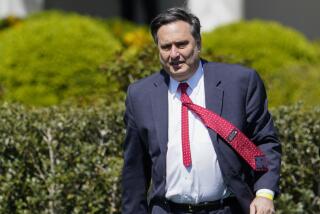Limping Away
- Share via
Another good soldier limped away Wednesday from the battlefield where the Pentagon and the State Department scratch and claw for President Reagan’s blessing in foreign policy.
After 30 years of government service that started as an Annapolis midshipman and ended as Reagan’s national-security adviser, Robert C. McFarlane gave way to his deputy, Vice Adm. John M. Poindexter.
McFarlane had his good moments and his bad. He helped sell the concept of a “Star Wars” missile defense to his boss. But he provided a balancing buffer between Secretary of Defense Caspar W. Weinberger, who knocks down arms controls at every opportunity, and Secretary of State George P. Shultz, who is tough on foreign policy but generally more realistic than that. McFarlane served the same function at the Geneva summit. He was honest and loyal and hard-working.
McFarlane is too good a soldier to head for the nearest publisher to write a kiss-and-tell story about what really happened, and perhaps the country never will know. Although he denied it, there clearly is more than rumor to reports that he could not get along with Donald T. Regan, the autocratic chief of staff. At least as important is the fact that a person can take only so much punishment in a position in which his President will not choose between contending policies and in which the bombardment never ends.
Still, he deserved better than he got Wednesday. He stood unsmiling while the President announced that McFarlane was resigning to move on to greater challenges. But when newsmen asked what those challenges were, he said that he had no plans. “If you’ve got any leads, let me know.”
The country deserved better, too. McFarlane has spent years in security policy, part of that time as a student of one of the masters of the game, Henry A. Kissinger. Although we wish him every success, Poindexter steps into the job with far less experience in policy at a crucial time for arms control and U.S.-Soviet relations generally. What the change probably means, at least for the near term, is that the clawing and scratching over policy will intensify, with the White House even less inclined to blow the whistle on either side than it has been in the past.


